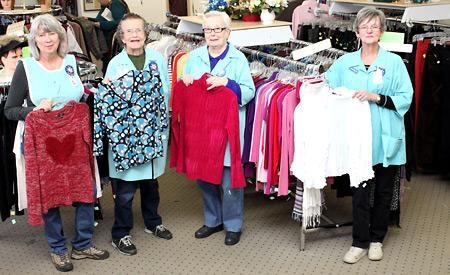Used clothing is an important and increasingly competitive commodity for fundraising in Powell River.
During the November 13 Powell River Regional District planning committee meeting, an expansion of recycling services in Powell River was reviewed. Mike Wall, manager of community services, outlined a plan by inclusion Powell River to collect used clothing and sell it to Value Village to raise funds.
Colin Palmer, Electoral Area C director, said alarms bells were going off for him because the Powell River Health-Care Auxiliary collects clothes to raise funds. Palmer asked if they would be upset about the inclusion Powell River program.
Wall said he asked that very question to an inclusion Powell River representative and was told the organization had spoken with representatives from the health-care auxiliary, the economy shop and two church organizations.
“She told me the answer was not at all,” Wall said. “They are inundated and can’t handle what they are receiving.”
Lorraine Stokes, secretary of the health-care auxiliary’s board of directors, said after the regional district meeting coverage appeared in the Peak, she was unsure who inclusion Powell River spoke with in her organization regarding recycling of clothes.
“They didn’t speak to the manager of the economy shop nor did they speak to any members of the board,” Stokes said. “The board is furious with this because we provide so much money to this town and we get it from clothing donations.”
Stokes said the board has invited the regional district’s Let’s Talk Trash team to its next executive board meeting because the board would like to know where the statement came from.
“We need this town to know we want every donation they give us,” she said. “Every dollar stays in this town. We are not inundated.”
Stokes said the health-care auxiliary has just started a new program in its shop, involving clothing that is not saleable because of stains, missing buttons or malfunctioning zippers. This clothing is going to a place in Surrey called Can-Am Exports and they pay the health-care auxiliary 15 cents a pound for it.
“We are getting money for stuff we can’t sell in our unit,” she said.
The health-care auxiliary faces competition for textiles from the Mennonite Christian Council establishment and now inclusion Powell River wants to do it, too, Stokes pointed out.
“They are all probably selling their extraneous stuff to the same place,” she said. “Every time you get one of these people down the line taking something out of our pocket, it’s out of Powell River’s pocket. That’s the way we look at it. Every cent stays here and it’s all volunteer.”
The health-care auxiliary made a donation of $877,000 to Willingdon Creek Village facility that will be replacing the Olive Devaud residence early this year. Stokes said on top of that, the auxiliary donates about $300,000 a year to health care purposes in the community.
Since the story was initially published in the Peak, Stokes said customers at the Economy Shop have been asking what’s going on.
“They are very upset and so we have to let people in this town know that we are not inundated,” she said.
“I’ve always said we are the greatest recyclers in town, whether it’s mechanical or electrical; anything we can take out of the waste stream, we do. We take metal down to Augusta Recyclers and get money for it.”
She said one of the misconceptions in the community is that the health-care auxiliary is affiliated with Powell River Hospital Foundation. “We have nothing to do with the foundation. We’re just a bunch of little old ladies and guys working their hearts for health care.”
She said if the auxiliary does not receive donations from the community it does not function.
“That’s where 90 per cent of our income comes from,” Stokes said. “We have to let people know we want all of their stuff.”
Lilla Tipton, inclusion Powell River’s executive director, said her organization plans to carry on with collection of clothing. She said her organization is a member agency with inclusion BC, which has put together an initiative to help agencies that have operated with reduced government funding for the last few years, to do some fundraising. Powell River has been operating with reduced funding.
inclusion Powell River will be purchasing collection bins and the collections will be sold to Value Village.
“I think there was a bit of a misunderstanding, unfortunately, with the regional district,” Tipton said.
Lisa Daniels has been representing inclusion Powell River in terms of getting the project up and running, and met with the health-care auxiliary executive to explain what inclusion Powell River is doing and why they are doing it, Tipton said.
“We’ve been told there is no shortage of supply of used clothing in the market and there is an abundance of people that want to give away used clothing,” she said. “We don’t believe there will be a significant impact because people choose who they want to donate to. We are hoping there will be some ability for us to do some fundraising, providing a different way for people to recycle their clothing than the current storefronts. It’s another option for people.”



